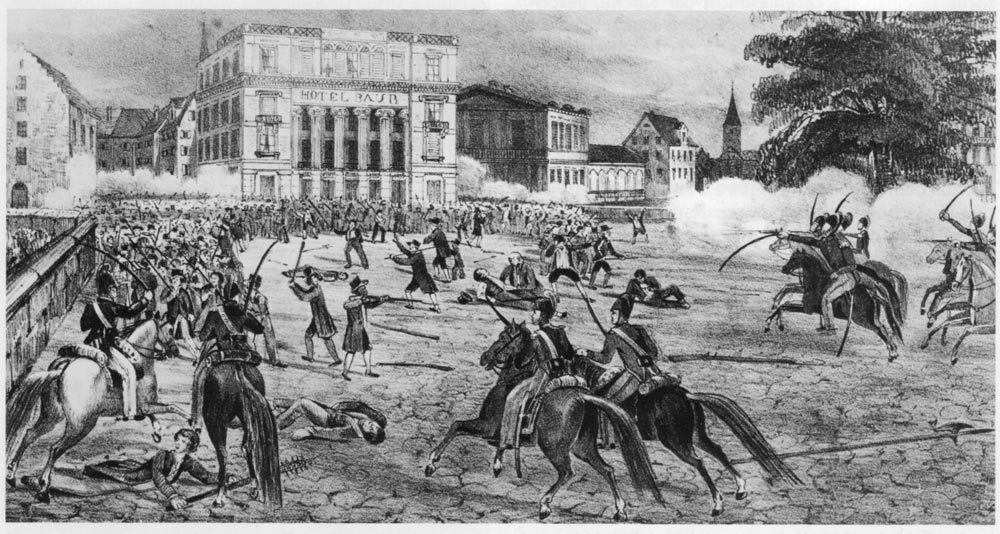Züriputsch on:
[Wikipedia]
[Google]
[Amazon]

 The Züriputsch of 6 September 1839 was a putsch of the rural conservative population against the liberal rule of the city of
The Züriputsch of 6 September 1839 was a putsch of the rural conservative population against the liberal rule of the city of
Etymology and definition of ''Putsch''
in German

 The Züriputsch of 6 September 1839 was a putsch of the rural conservative population against the liberal rule of the city of
The Züriputsch of 6 September 1839 was a putsch of the rural conservative population against the liberal rule of the city of Zürich
, neighboring_municipalities = Adliswil, Dübendorf, Fällanden, Kilchberg, Maur, Oberengstringen, Opfikon, Regensdorf, Rümlang, Schlieren, Stallikon, Uitikon, Urdorf, Wallisellen, Zollikon
, twintowns = Kunming, San Francisco
Z ...
on the eve of the formation of the Swiss federal state. The reason for the putsch was the appointment of the controversial German theologian David Strauss
David Friedrich Strauss (german: link=no, Strauß ; 27 January 1808 – 8 February 1874) was a German liberal Protestant theologian and writer, who influenced Christian Europe with his portrayal of the "historical Jesus", whose divine nature he ...
to the theological faculty of the University of Zürich by the liberal government. The rural population saw the old religious order in danger.
Events
Led byBernhard Hirzel
Bernhard Hirzel (12 August 1807 – 6 June 1847 in Paris) was a Swiss theologian and Orientalist.
He studied theology in Zürich (1819–31) and philology in Berlin and Paris, promoted 1833 in Göttingen. He married Maria Elisa Tobler in 1833. ...
, pastor of Pfäffikon, several thousand putschists stormed the city from the west, and fought the cantonal troops in the alleys between Paradeplatz
Paradeplatz is a square on Bahnhofstrasse in downtown Zürich, Switzerland. It is one of the most expensive pieces of real estate in Switzerland and has become synonymous with wealth and the Swiss banks, being the location of the headquarters ...
and Fraumünster
The Fraumünster (; lit. in en, Women's Minster, but often wrongly translated to urLady Minster) is a church in Zürich which was built on the remains of a former abbey for aristocratic women which was founded in 853 by Louis the German for h ...
. Botanist and councillor Johannes Jacob Hegetschweiler
Johannes Jacob Hegetschweiler (4 December 1789, Rifferswil – 9 September 1839, Zürich) was a Swiss physician and botanist. He is remembered for his investigations of Alpine vegetation.
Biography
In 1809 he studied medicine at the medic ...
was shot in the head as he was acting as a mediator between the city's council and the insurgents. He died three days later.
The Swiss German
Swiss German (Standard German: , gsw, Schwiizerdütsch, Schwyzerdütsch, Schwiizertüütsch, Schwizertitsch Mundart,Because of the many different dialects, and because there is no defined orthography for any of them, many different spelling ...
term ''putsch'', originally referring to any sort of hit, stroke or collision, entered the German language as a political term, popularized by Gottfried Keller. The word gained further use during the First World War
World War I (28 July 1914 11 November 1918), often abbreviated as WWI, was List of wars and anthropogenic disasters by death toll, one of the deadliest global conflicts in history. Belligerents included much of Europe, the Russian Empire, ...
, as the equivalent of the English "push," to mean "going over the top" from a trench into no man's land. The derived verb ''aufputschen'' remains common in Standard German
Standard High German (SHG), less precisely Standard German or High German (not to be confused with High German dialects, more precisely Upper German dialects) (german: Standardhochdeutsch, , or, in Switzerland, ), is the standardized variety ...
for "to incite", "to excite", in political or in doping contexts.in German
See also
*History of Zürich
Zürich has been continuously inhabited since Roman times. The vicus of '' Turicum'' was established in AD 90, at the site of an existing Gaulish ( Helvetic) settlement.
Gallo-Roman culture appears to have persisted beyond the collapse of the ...
References
{{DEFAULTSORT:Zuriputsch 1830s coups d'état and coup attempts 1839 in Switzerland History of Zürich Conflicts in 1839 History of Christianity in Switzerland